- Home
- K. A. Tucker
A Fate of Wrath & Flame Page 3
A Fate of Wrath & Flame Read online
Page 3
She studies my face, as if I’m an object worthy of scrutiny. “I can see that you are terribly wise for your youth. And loyal. I appreciate that.”
“More like I like breathing,” I mutter through a sip. The drink was meant as a prop, but I’ll be ordering another to fill my sweaty palm soon.
“So, it is fear that keeps you with him. A need for self-preservation.”
The last decade of my life has been all about self-preservation.
Despite my veil of suspicion, I pity this woman. Whoever Malachi is, he sent her here on a fool’s errand. I lower my voice. “Maybe you should take some lessons, then, because dropping Korsakov’s name around the city like this? It’s a bad idea.”
“Mais oui, I understand he is a dangerous man.” She waves her hand dismissively, and my eyes catch the gold ring on her finger. The band is chunky and ornate, the finish antique, and the sizable white stone held within the claws holds no sparkle. I might dismiss it as a bubblegum-machine prize if this woman weren’t wearing it.
“You don’t want to get mixed up with him, believe me.” Maybe she thinks her beautiful face will buy her grace, but Korsakov is an equal-opportunity killer when someone threatens his empire.
She peers at me again with that measuring stare. “And why are you mixed up with him, then?”
“Because I don’t have a choice.” The words come out unbidden. I quietly chastise myself for allowing them to slip so easily. It makes me appear weak and fearful—nothing more than a pawn, a piece to play in someone else’s game. And I suppose I am, to some degree, though I have my own game in play too. An endgame out of this life.
“You have a binding agreement with him.” Sofie’s eyes don’t reflect any pity. If anything, I see genuine interest.
“More like a debt I’ll never be able to pay off.” I was eighteen when I lifted that diamond bauble off the wrong hand at a nightclub. I took it to the pawnshop the next day, where I hocked everything I stole, knowing Skully would pay me a fraction of its worth, but he wouldn’t ask questions. That bulky wad of cash in my pocket had me literally skipping out of the shop. It would keep me afloat for months if I was thrifty.
The next day, three men tracked me down and dragged me into a black SUV. Turns out the ring I stole belonged to Viggo Korsakov’s daughter.
I still remember standing in the warehouse office in front of the Viggo Korsakov himself, a man with pinched eyes and a cruel smile. One of the fluorescent lights above blinked, ready to give out, making the whole scenario more ominous. It took every ounce of composure to keep my limbs from trembling and my bladder from letting loose as I sang apologies and excuses, begging him not to use the meat cleaver that waited idly on a nearby table. How would I survive without my hands? Stealing was what I was good at—and I was excellent at it.
He offered me a deal instead. Skully had told him about my eye for quality, that the “merchandise” I’d been delivering over the years far outvalued the typical trinkets and trash he bought from others. Korsakov had need of a thief of my talent and profile—young, pretty, unexpected, and most surprising, without fingerprints in the criminal system. If I agreed to work for him, he would forgive me for my grievous mistake.
I’d heard enough whispers on the street about the man to know it wasn’t a choice, not if I wanted to walk out of that warehouse with my hands, so I accepted his offer.
That was three years ago, and while I don’t have my freedom, my life hasn’t been bad. Gone are the days of sleeping in youth shelters and vans, on couches, or tucked into an alcove at the public library when a night guard took pity. I now have a quaint studio apartment in Chelsea, with an exposed brick wall and south-facing window where basil and rosemary grow in pots on the sill, and my fridge is always filled with fresh fruit and meat that I paid for.
Korsakov tasked his daughter—the very one I had stolen the ring from—with transforming me from a scrappy street kid who loitered in dark corners to the pedigreed woman who could stroll into high-society charity events without earning a blink of suspicion. I no longer spend my days in search of valuables left in cars and careless fools who don’t guard their wallets and purses. Now, I lead a relatively typical life, relying on my talents only when Korsakov taps my shoulder with a ticket to one of these parties, where I blend in like a chameleon long enough to appropriate well-insured jewels from rich assholes. That’s what he calls me: his chameleon.
But in the end, I’m still a thief, one who feels more indebted to Korsakov now than I did three years ago. Short of disappearing into the night and spending the next however many years watching over my shoulder, I don’t have options. I’m stuck with him until he’s six feet under or he no longer sees value in me—which could mean I’m six feet under.
Sofie tips her glass to polish off the last of her wine before gingerly setting it on the counter. “Forgive me. I can sense that you are anxious. I shall not keep you from your task any longer. Do not do something silly, like get caught.” She winks, and as quickly as she appeared at my side, she vanishes into the crowd, leaving me rattled to my core.
“He’s pissed.” Tony drums his thick fingers against the passenger door to the tune of the sweeping windshield wipers. “Two major screw-ups in a row. My brother’s little lizard isn’t worth his trouble anymore.”
I roll my eyes at the back of the big oaf’s head, knowing he’s watching me through the side mirror and will catch it. Tony is enjoying my empty hands far too much for someone who’s supposed to be on the same team. I’m not surprised, though. He was the one safeguarding Anna the night I stole her ring. It earned him a smashed nose that healed crooked and three broken ribs, as well as a demotion in rank that he hasn’t gained back yet. He has despised me ever since, made worse on nights like tonight when he’s assigned to babysitting duty.
Tony’s opinion doesn’t matter, but I know Korsakov will not take lightly to a second miss—especially not this one. He already had a buyer lined up, and he hates reneging on a deal.
I’ve learned not to show fear around these guys, though. Assholes like Tony will feed off it like a rabid coyote until there’s nothing left of me but bones. “It’s late. Drop me at home and I’ll go talk to him tomorrow.” Korsakov’s temper is scalding, but it cools quickly. It’s best not to be around him until it does.
“Nah.” Tony’s grin is wide and obnoxious. “He called before you came out. Said to bring you in tonight.”
“Fine. Whatever.” I feign indifference but my stomach roils. That doesn’t bode well for me. He couldn’t have known I’d failed by that point. But maybe he’d made a decision about my fate in case I did.
I focus on my breathing as our SUV meanders along the city streets, the hazy glow of brake lights and relentless blast of taxi horns oddly therapeutic. My target left before I could make my move, but it would’ve been too risky, anyway. I have to assume Sofie is somehow tied to the feds, and if those cuff links went missing tonight, my studio apartment door would be the first they kicked down.
“What’s with the souvenir?” Tony asks.
He means Sofie’s glass that I swiped off the bar before the bartender could come by to collect, smuggling it out beneath my wrap, careful not to smudge her fingerprints. “You use it to drink wine.”
“You know, one of these days, that smart mouth of yours is gonna get you into real trouble. Why’d you lift it?”
“Because I needed a new one.”
He snorts. “Idiot.”
I took it thinking I’d give it to Korsakov when I told him about her, as a way of buying myself a pass for tonight’s failure. But the more I consider that plan, the more I realize it’s likely that he’ll decide I’ve been compromised. Last year, when Rolo was caught having a cozy chat with the DEA, Korsakov set him free with a bullet to the back of the skull. At least that’s the rumor—Korsakov is not dumb enough to murder with an audience. But no one, including Rolo’s wife and kids, have seen him since.
Tony is right. I am an idiot, for not slipping
out the back of the venue while I still could.
My insides are churning when I spot the familiar vendor cart up ahead. “Stop here for a minute?”
“Seriously?” Tony twists his massive frame around to scowl at me.
“I’m starving,” I lie. I doubt I could manage a bite.
“You just left a penguin-suit party full of food!” He groans loudly—he always complains when I ask to stop—but then he nods at Pidge. “Fuck, yeah, whatever.” He adds under his breath, “Considering it’s probably your last meal.”
“I’ll even eat it outside,” I offer, my voice dripping with phony sweetness. The only thing Tony despises more than me is the smell of hotdogs and sauerkraut.
“Yeah, you will. You’re not stinking up this leather for the next week.” He shakes his head. “Can take the girl out of the street, but can’t take the street rat out of the girl.”
“There’s an umbrella under my seat,” Pidge offers as I gingerly set Sofie’s glass down.
“Thanks.” He’s quiet and the nicest of the bunch, but he’d still sell his own sister for the right price. I hop out, my clutch tucked under my arm. The dress I’m wearing is a sleek black satin halter style that pools around my feet—the least flashy of the designer lot the guys procured in their latest heist. Neither it nor my wrap offer any protection against the bone-chilling November air, but in my present state of mind, I barely notice.
I want to believe Korsakov wouldn’t end me, not over this. Ironically, the man has shown me more kindness than he does to most, albeit in his own way. Once, one of his goons took the “do not touch my pretty little thief” law as mere guidance and tried to force himself on me. Korsakov had the skin flayed off his back with a whip. I know because Korsakov made me watch the spectacle, smiling as proudly as a cat presenting a massacred bird at its master’s feet. Only Korsakov isn’t an ordinary cat. He’s a tiger who occasionally lunges at those who feed him.
But the phone call, the demand to see me with or without the cuff links …
Does he already know about the red-haired woman sniffing around me?
Or has he somehow learned about the discreet inquiries I’ve been making into securing a passport? About the cash I’ve been squirreling away in my vent and the apartment in London that I’ve looked at renting? If he has, would he see that as anything other than what it is—an escape plan?
My instincts are telling me to run.
I pick my way along the sidewalk, trying to avoid the puddles as I scramble to devise my strategy. Do I just kick off my heels and bolt? Do I wait until I’m a safe distance away to give myself a head start? I could cut through the park and jump into a taxi on the other side. Going back to my apartment to grab my stash bag would be a risk, but there’s no point going to the train station without it. It has money, clothes, a fresh ID—everything I need to disappear.
I’m only partly surprised Tony let me out. He’s stupid and arrogant enough to assume I won’t take off. Or maybe he wants me to, so he has an excuse to give his brother when he delivers me battered and bruised.
I’m still weighing my best course of action when I reach the stand. Alton is hunched in front of the grill, turning a sausage over the flame. “Yeah?” He grunts before glancing up. Instant recognition touches his face. “Haven’t seen you around in a bit.” I’ve come a long way from the gangly kid with heavy kohl-lined eyes and bleached hair who stole a hotdog from him. But he once said that it doesn’t matter how much makeup I hide behind or what color my hair is; all he needs to know it’s me are my blue eyes. They remind him of his childhood summers by the Adriatic Sea.
It’s been a few months. “I’ve been busy.” I dare a glance over my shoulder at the waiting SUV, its blinking hazards earning angry horn blasts from vehicles coming up behind. Tony can’t climb a flight of stairs without wheezing by the time he reaches the top; I could probably outrun him, even in my heels. But Pidge is smart enough to drive around and catch me on the other side of the block.
Alton opens his mouth to say something but promptly shuts it. I already know what he’s thinking. It’s what all my street acquaintances think: that I’m thriving as a high-end prostitute. I’ve never bothered to correct them. It’s more honorable to peddle what you own than what you’ve stolen. “Glad to see you still kickin’ around,” he offers.
Not for long, possibly.
If I head for one of the benches in the park to eat, I’ll have the best shot at slipping away without immediate notice. It might give me just enough time.
“The usual?” He holds up a foot long in his metal tongs.
I smile. “Yeah.”
“One for him too?” Alton nods to his left, his eyebrows raised in question.
I follow his direction to the lump of blankets on the sidewalk fifty yards away, and surprise pushes aside my escape planning for the moment. “Is that Eddie?” Has it been six months already?
“Yup. He’s been hanging around here for a few weeks now.”
“And?”
Alton shrugs. “Hasn’t scared away my customers yet. I think his eyesight’s gotten worse, though.”
Maybe Eddie’s time in prison has helped where nothing else ever has. “Give me two dogs. Please.” I always buy an extra meal when Eddie’s around. Alton has guessed that he’s someone to me, but he’s never pressed for details.
I tuck a twenty under the napkin dispenser on the counter and wave away the change, as always. I’ve lost track of the meals the kindhearted street meat vendor has given me over the years, when I was starving and couldn’t pay for them.
Gripping both in one hand while I huddle under the umbrella’s shelter, I make my way over, ignoring the horn that blares of warning from the curb. The closer I get, the more potent the stench of stale urine and body odor becomes. “Hey, Eddie.”
The man peers up from beneath his soiled quilt, squinting against the rain. Or perhaps it’s to make out what’s in front of his failing eyes. They cut his hair and beard while he was inside, so he doesn’t look nearly as straggly as he did when I last saw him, and he’s put on a few pounds. He’s lost another tooth to decay, though. “Is that you?”
A painful lump stirs in my throat. “Yeah.” At least he’s aware tonight. “How are things?”
“They won’t let me in at St. Stephen’s anymore,” he grumbles.
“That’s because you threatened to kill a volunteer there. That’s why you went to prison.” It brought me comfort, knowing he had a warm, dry place to sleep and three meals a day, even if it was courtesy of the county jail.
“He tried to poison me. I saw him do it with my own eyes.”
I bite my tongue against the urge to remind him that it was fresh parsley that the man—a schoolteacher volunteering at the soup kitchen—sprinkled over the shepherd’s pie. Forget his weakening eyesight, Eddie’s so far gone to delusion, he won’t hear any version of the truth other than his own. “Here. I brought you something.” I hold out both hotdogs for him.
His eyes narrow as he studies them, not making a move.
I sigh heavily. “Come on, Dad, it’s me, Romy. You need to eat.”
After another long moment, he accepts them with a grimy hand. Tucking one under his quilt for later, he scrapes the toppings off the other with a swipe of his dirty thumb. Sauerkraut and mustard splatters on the sidewalk beside my heel, a few yellow drops hitting my hem.
“So? Things are okay? No aches or lumps or anything that you should get checked out by a doctor?” He’s a forty-nine-year-old man who could easily pass for seventy, the decade of living on the street aging him far beyond his years.
“Watch out for the demons. Especially the ones with the twisty horns. They’re here, walking among us, wearing our skin.”
The foolish shred of hope I held coming over here evaporates. Nothing has changed.
“I will. Definitely.” It used to gut me to see this version of my father—perched on milk crates and park benches, ranting about monsters who lurk in the shadows and feed
on human souls. That was back when the memories of our old life were still fresh in my mind.
Once, long ago, we lived in a two-bedroom apartment in East Orange, New Jersey. My dad was a line supervisor at a factory that made bolts and screws, and my mom was a grocery store clerk. I took swimming lessons and played soccer. We ate dinner at six p.m. sharp and would drive to a farm every fall where we would spend hours searching for the perfect pumpkins for jack-o’-lanterns.
I lost that version of my father the night he witnessed a woman’s brutal murder in the parking lot at work. He claimed a shadowy monster with wings and curly black horns was the culprit, tearing her apart with its talons, and that a witch channeling flames from her fingertips banished it back to Hell.
He was never the same after, spiraling down a tunnel of hallucinations and paranoia that no medications or doctors were able to treat or explain. He lost his job, we lost our apartment, and eventually, it became unsafe to be around him.
We tried to get him help, but we had no money, and the system for people with no money is made from safety nets riddled with holes. My dad slipped through every last one until he landed on the street where he’s been ever since.
I spent years angry and pretending he didn’t exist, and then years weighed down by guilt and attempts to help him—arranging doctor’s appointments he refused to go to, housing he wouldn’t stay in, buying clothes he’d lose.
Now, all I have left to give him is a hollow heart, a cheap meal, and a few kind words when I run into him on the street. I have my own problems to deal with.
“I’ve got to go.” A narrow path lies ahead, cutting into the bushes next to a trash can. If I pretend I’m disposing of the wrappers, it should buy me a small lead. Pidge and Tony will go straight to my apartment once I don’t return, but if I wait them out a few days, I should eventually be able to slip in, get my things, and run.
“Your mother came by,” my father says through a bite. “She asked about you.”
Hearing mention of her always stings, but I quickly harden my heart. I know she still looks for me occasionally. “She still with them?”

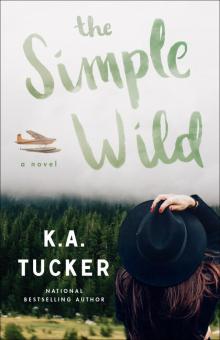 The Simple Wild
The Simple Wild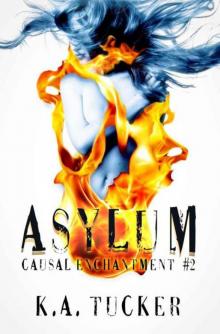 Asylum
Asylum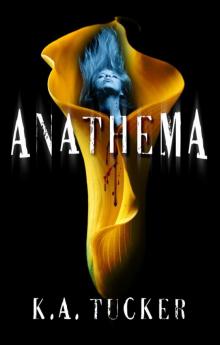 Anathema
Anathema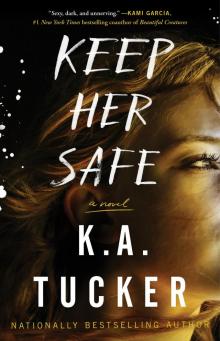 Keep Her Safe
Keep Her Safe Chasing River
Chasing River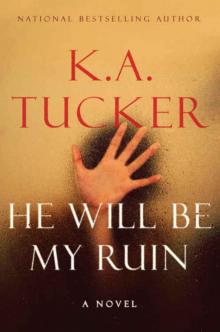 He Will Be My Ruin
He Will Be My Ruin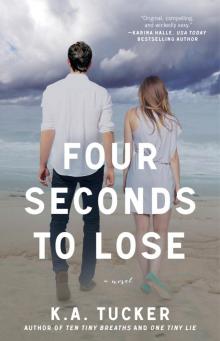 Four Seconds to Lose
Four Seconds to Lose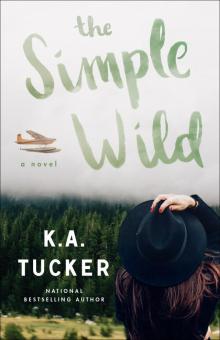 The Simple Wild_A Novel
The Simple Wild_A Novel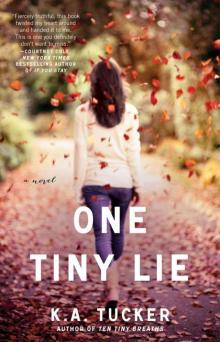 One Tiny Lie
One Tiny Lie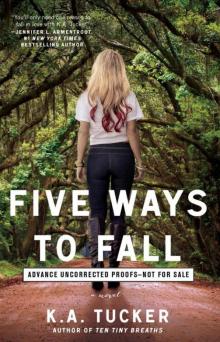 Five Ways to Fall
Five Ways to Fall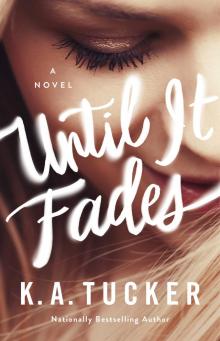 Until It Fades
Until It Fades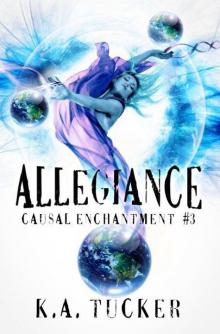 Allegiance
Allegiance Say You Still Love Me: A Novel
Say You Still Love Me: A Novel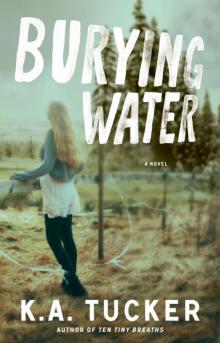 Burying Water
Burying Water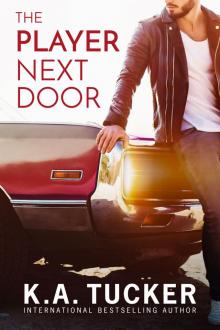 The Player Next Door: A Novel
The Player Next Door: A Novel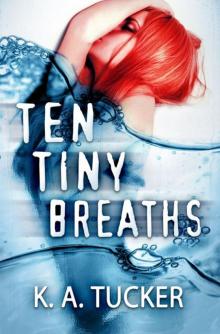 Ten Tiny Breaths
Ten Tiny Breaths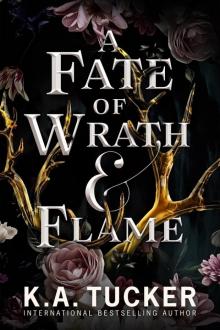 A Fate of Wrath & Flame
A Fate of Wrath & Flame Forever Wild
Forever Wild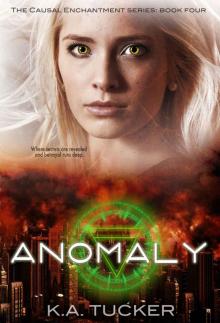 Anomaly
Anomaly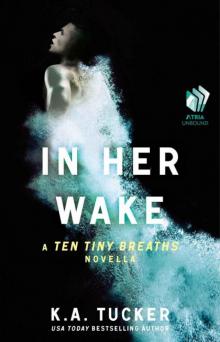 In Her Wake
In Her Wake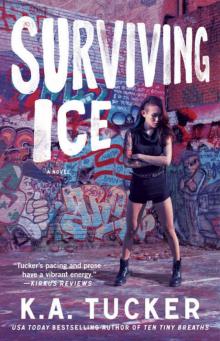 Surviving Ice
Surviving Ice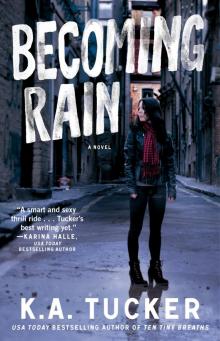 Becoming Rain
Becoming Rain Running Wild: A novel
Running Wild: A novel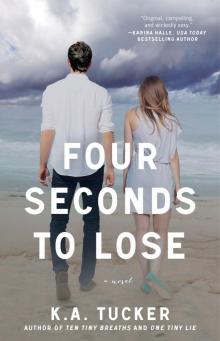 Four Seconds to Lose: A Novel
Four Seconds to Lose: A Novel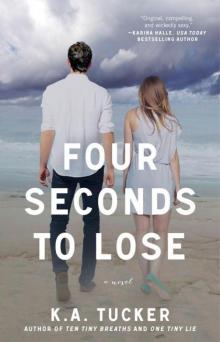 Four Seconds to Lose ttb-3
Four Seconds to Lose ttb-3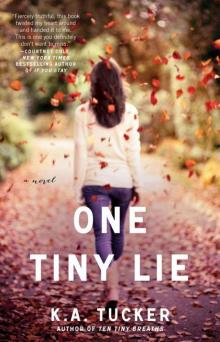 One Tiny Lie: A Novel
One Tiny Lie: A Novel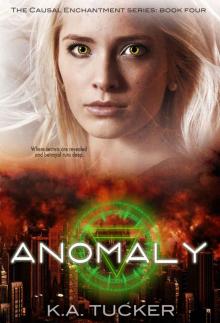 Anomaly (Causal Enchantment)
Anomaly (Causal Enchantment)